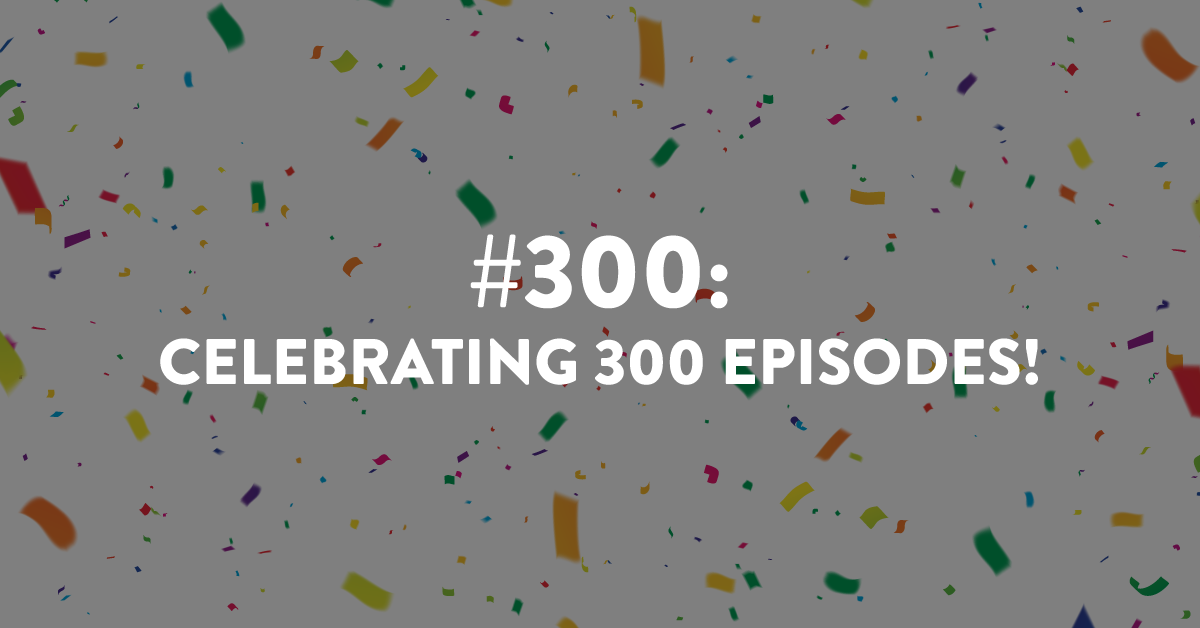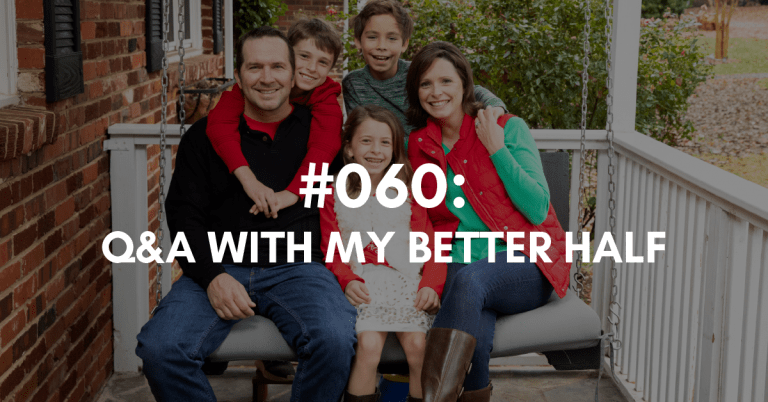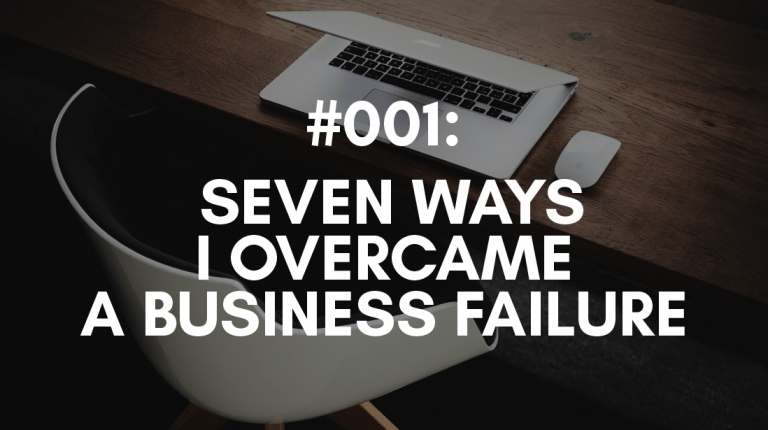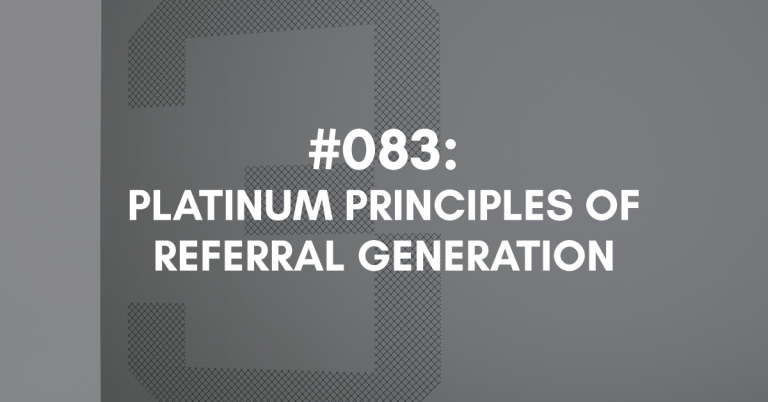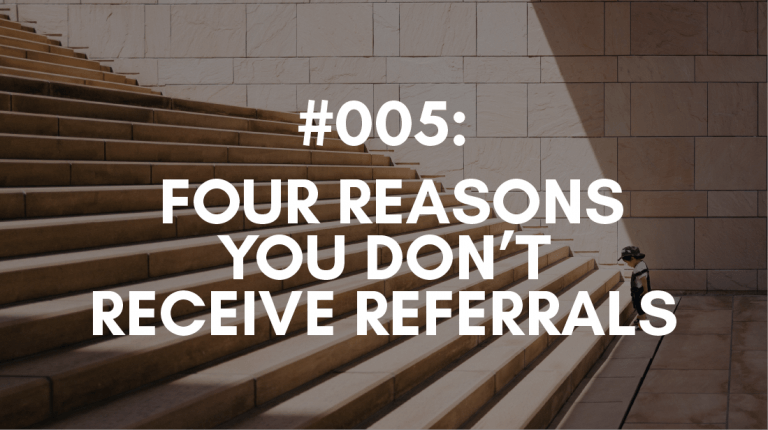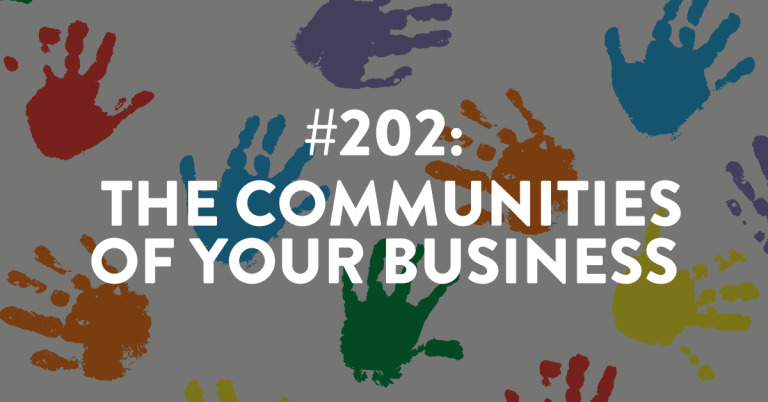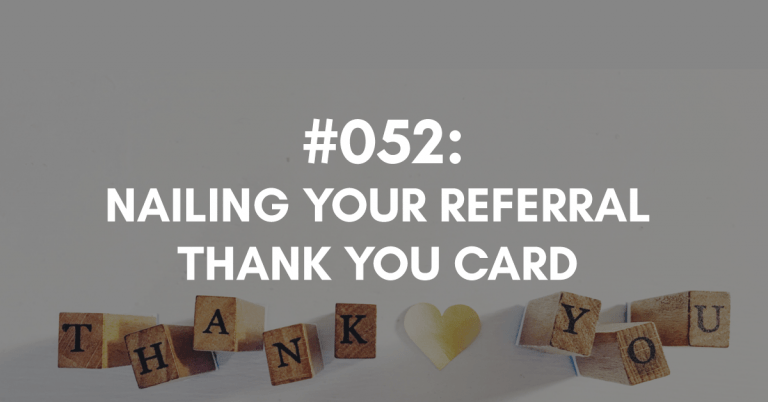Ep #300: Let’s Celebrate Hitting Episode 300!
We are celebrating our 300th episode of the Roadmap to Referrals podcast!
In this special episode, I reflect on the incredible journey we’ve been on together and share 13 valuable lessons I’ve learned along the way.
Below are three of the lessons from this milestone episode:
The Power of Connectivity: I’ve discovered the unique connection that comes from sharing knowledge through this platform. The bond created by hearing my voice in your ears each week is truly special, and I appreciate every one of you who tunes in regularly.
Setting Boundaries: One of the most significant things I’ve experienced is learning to set boundaries between my free and paid content. It’s essential to recognize the value of the knowledge and information I provide and to establish clear boundaries to honor the investment my clients make in working with me.
Repeating is Caring: Some topics are worth repeating, and I firmly believe that repeating valuable information is a way of showing care and dedication to helping you succeed in building a referable business. By revisiting important topics, I aim to ensure that the knowledge shared is impactful and beneficial to you.
In addition to this, we also have some of our Building a Referable Business coaching program members sharing their experiences inside BRB. If you are interested, we would love to have you join us!
I am incredibly grateful for your support, feedback, and engagement. I look forward to continuing to provide valuable insights and guidance on building a referable business in the upcoming episodes. Thank you!
Tune in to the full episode to discover all 13 lessons learned on the road to 300 episodes!
Links Mentioned During the Episode:
Learn how to work with me inside my Building a Referable Business™ coaching program. Check out the program and then apply to see if you’re a fit.
Want me to build your Referral Strategy for you? Then check out my VIP Referrals In A Day service where I handle the heavy lifting for you. First step is to apply to see if you’re a fit and then we’ll schedule a call. (*A minimum of a 2-person team is required for this Done-For-You service.)
Next Episode:
Next episode is #301, which is another episode created with you and your needs in mind.
Download The Full Episode Transcript
Read the Transcript Below:
Stacey Brown Randall: Hey there and welcome to episode 300 of the Roadmap to Referrals podcast, a show about helping you build a referable business. I’m your host, Stacey Brown Randall. My journey from a business failure to a successful business now 10 years in, I know generating referrals naturally and consistently has made all the difference. Working with clients around the world, we leverage the science of referrals, protect relationships above all else, and help you build a referable business.
Welcome to the celebration of hitting 300 episodes. This is as much my success as it is yours. Because if you guys did not show up every single week to listen to this episode, and then to go back and catch up on what you missed, and then sharing this episode with other people, or of course, giving that fabulous five-star rating and reviews for this show, well, let’s be honest, there is no way I would have made it this far. There is no way I would have made it to 300 episodes.
So we’re going to do something a little bit different. And I think we will find this to be fun. At least I think it’s going to be fun. As I was mapping it out, it felt fun. So let’s just go with that. All right. I am going to share here are the 13 things I learned from 300 podcast episodes.
Now, wait, you didn’t actually think I was going to do 300 things that I learned. I mean, let’s be honest, folks, even I wouldn’t listen to that episode because that seems like a whole bunch of things. Even 30 sounds too much. So we’re doing 13 things, which is one of my lucky numbers. Yes, it is. And it’s 13 in honor of 300. You know, the threes, they go together. OK, let’s rock through these.
All right, of the 13 things I learned, after 300 podcast episodes, here’s what I’ve learned in this journey of five years.
Number one, there are more ways to talk about referrals than I ever imagined. When I first sat down back in 2018 and I outlined what would be the content of my first 10 episodes, I remember there was a moment in that first year and I was like, I got to talk about this for 52 weeks, like 52 episodes?
You force yourself real fast to get real good at making sure that you know how to come up with content that others are going to find helpful when you’re talking about a singular topic.
All right, number two, the second thing. The power of connectivity to you guys, my listeners, when you meet me in person or you direct me on LinkedIn or Instagram or sometimes you just email me, there is a connection that I just don’t find with the other mediums that I use to share knowledge with the people who want to learn from me.
So when I think about all the ways that you can put content out there, right? The books, the podcast, of course, social media, videos, all that kind of stuff, there is just a different connectivity that happens and connection that happens that I just don’t find with other platforms than I do with the podcast.
And I think it has to do with you hearing my voice in your ears or coming out of your speaker every week. So thank you to those who listen to every week. I wouldn’t trade that connection for anything.
If you’re a podcast listener and you ever run into me, see me at an event or whatever, please come up and say hello. We just, there’s a connection there and I just, it’s different and I just love it. I think it’s pretty awesome.
That doesn’t mean if you’ve, you know, watch some of my videos on YouTube or of course you follow me on social media or you’ve read my book, I want you to come up to me too. But there is something different about people who’ve heard me talk about this, that there’s a connection there.
All right, the third thing learned from 300 episodes. This podcast, and this is not something I anticipated when I started, but this podcast gives me a platform to flesh out my thoughts and go deeper with how I explain things.
It has also helped me make major progress on book number two after using one of the summer series to do a deep dive in the space of referable client experience. I think it’s part of that concept of like, hey, or that idea that every week there’s another episode coming out and there’s 52 weeks. And I think that that has allowed me just to really be able to sit with my thoughts and to sit with what I’m hearing people tell me.
And when I answer questions that come in through my coaching program or that come in through my VIP clients, and I’m just listening to these questions, just this platform, because I get to verbalize it, and I am a little bit of a verbal thinker, if you haven’t noticed, that it really helps me go deeper with my thoughts and that’s awesome and I think it makes me better at what I do.
Alright, number four. What I teach is better and richer because the podcast allows me to evolve and improve my thought process as new situations come up and times change.
So I think that’s one of the things that I kind of look back over the last five years, and because I’m talking about this topic so intimately, so deeply, so often, and life around us is changing, it allows me to adjust when things are changing or things have happened.
I don’t know how many of you guys are like been with me since like the beginning, right? But in the beginning the label was applied to me and the work that I do, and this is even actually before the podcast because now the business has been out over 10 years and the podcast is just over five years old.
But this is like early days, and some of it lingered in the beginning of the podcast, where the label that was applied to me was referral marketing. Now, if you know me, I teach those are not two words that go together. It still happens today. People are like, oh, you’re the referral marketing person. I’m like, no, I’m not. I’m the referral person. You’re going to have to get somebody else to do your marketing.
So they’re different, but the way that we get to evolve and spend time in this space has allowed me to really just stretch and to gain more confidence in terms of what I believe and how I believe it, because I’m showing up with this platform being able to go deeper and allow my thought process to evolve.
Particularly, we did a lot of evolution in 2020. We all know that. And we continue to do it with different economic situations as well.
Okay, the fifth thing. It was a very conscious, particular, specific decision for when I started this podcast for this to be a solo-based show. I knew from the very minute that I was open to the idea of doing a podcast, which of course I had like laughed at for years prior to starting this podcast.
It’s kind of like how I laughed at how awful I thought cottage cheese was and now I eat it all the time, right? Like, it’s just one of those things. But I knew from the very minute that I was like, okay, I’m going to do a podcast. Very specifically. I was like, it will be a solo-based show.
And I think that that was very intentional. And back then it was because I knew that I was talking about referrals differently. I was a contrarian, right? I still am. You would think that like the way that I teach it would like not be so like, oh, really? But it is, the referrals without asking.
And so I knew when I started my show, I didn’t need a bunch of people coming on the show to talk about referrals with me. Because I was trying to establish that there is science behind referrals, a different way to think about referrals, a different way to cultivate referrals.
I had seen it work for my business. I had seen it work for my early on clients. I was starting to see results happen when I was doing workshops and then my online programs. And then it was evolving as I was working one-on-one with clients.
I knew that what I was teaching about referrals was different. So I didn’t need anybody else’s voice on the podcast. I needed to be able to do a solo-based show, which means, of course, there is a lot of content that has to then be produced by me. But that doesn’t mean, of course, that I don’t bring guests on. And I also had to evolve in who do I bring on.
I’ve had guests that are not clients of mine on the podcast over the years. Some friends are experts in certain areas. And I was like, I want that topic talked about on my podcast. So Michelle Williams is like my Profit First guru and friend. And so when I want to talk Profit First or I want to talk finances, I’m like, Michelle is my go-to person with Scarlet Thread Consulting.
So there have definitely been people that I have had on the podcast over the years because that was a topic I wanted to talk about and I’m not the expert in it and I needed to bring somebody else in. But those are actually few and far between.
There was a conscious decision not only for the solo-based show, but then when I did bring guests on that they were going to be clients that could then talk about, so you could hear from other business owners how they think about referrals and how they have evolved their thought process on referrals and the changes and successes they have had by working in a way that show and prove that referrals without asking actually does work.
So not only was it a very conscious decision for this to be a solo-based show for me because I was trying to like swim upstream. I feel like I’m constantly swimming upstream when it comes to all the other bad advice that’s out there about referrals. The same thing when I brought my guest on. They needed to be my clients because I needed you to hear your reality in somebody else’s success. And that was really important.
All right. Number six, the sixth thing I’ve learned from 300 episodes in is mapping out an editorial calendar every year for the 52 episodes I’m going to do has truly been my lifesaver and my lifeline. If I had to wing this thing, I would probably have a nervous breakdown about once a month.
The fact that I sit down in, usually starts around October, November, but really in December, I sit down with a new tab on the spreadsheet. And if I were to pull up the editorial calendar, you would see a tab from 2024 all the way back to 2018 when the podcast started. There’s a tab every year, 52 episodes moving forward, right?
And so the fact that I do map it out, the fact when I come across an idea, I have a place to go store that idea. I can move things around. I can see how things flow together. I’ve got a buddy, Jordan, who always says, he goes, the fact that you can actually tie things together and weave things in, he goes, it really, like there’s a lot of thought process that goes into it.
And I was like, you have no idea. You have no idea. Like thinking through what’s going on from a business perspective, what’s happening out there, what questions you guys are asking, but then also tying together the episodes.
So it’s not just a one-off episode here. And then next week you hear about something else. And the next week you hear about something else, but they’re like all tied together. And they’re obviously hopefully useful information that you need as well. I think that’s important too. Okay, let’s move on to number seven.
Stacey Brown Randall: Hey there, pardon the interruption. But have you ever wondered how a current member of my Building a Referable Business coaching program would describe their experience being a member of that program and working with me? Well, I did. I wondered. So I asked them. And here’s what they had to say.
Client: If I had to describe BRB in one word, it would be transformative. It really changes the way that you look at your interactions with the people who can provide business for you.
Client: I would define BRB in one word as a community. It’s always a positive experience. She’s extremely, well, she’s very organized. She makes everything seem easy, even when it’s not actually easy. And she’s extremely motivating.
Client: Defining BRB in one word would be relationships.
Client: BRB, in one word, effective. If you’re looking for an effective program, BRB is it. If you’re looking for a great, knowledgeable expert and cheerleader, then Stacey’s definitely the person to work with.
Client: If I could define BRB in one word, it would be elevate, because it’s certainly elevated my business.
Client: BRB means progress to me. What I would say to someone, the reason to join BRB, is if you’re in a business that’s a referral business, and that’s the most important piece of your business, then I can’t think of a better way to invest in it than invested it in the best authority when it comes to referral business. Stacey.
Stacey Brown Randall: Thank you to my members for describing their experience in the Building a Referable Business coaching program in just one word. Want to join us inside this program? Go to StaceyBrownRandall.com/referable to learn about the program and click on the link to submit your application. Now, back to the episode.
Stacey Brown Randall: Okay, here’s the seventh thing that I have learned about hitting 300 episodes. Repeating is caring. Some topics, some nuances of individual topics are worth repeating. And so I do. I repeat them. And sometimes people think I repeat them a lot.
But it’s really, really important because I find there’s so much misinformation out there when it comes to referrals in general, that sometimes I just feel like, hey, you know, I may have talked about this a year ago, but we need to talk about this again.
And I believe that repeating is caring. Some people say sharing is caring. I agree. I do think sharing is caring, right? But I also believe that repeating is caring because some topics are worth repeating.
Okay, here’s number eight. Content churn. Okay, let’s get real, my friends, right? Content churn, oh, it is so very real. And sometimes I have had to push myself to not give up. Fifty-two episodes a year, every week for five plus years. That’s a lot of content.
That’s a lot of me talking into this microphone for your benefit for 20 to 30 minutes almost every single week. And I say almost because obviously sometimes I have other people that I’m interviewing, so it’s not just me talking into the microphone. Fifty-two episodes a year every week for the last five plus years.
I just want to give a shout out to my friend Melisa Galasso, who emailed me one Tuesday to give me a heads up when the episode back then, it was the latest episode back then, didn’t show up in her podcast app.
It was right before Christmas, I mean it was right after Christmas, I think it was like 2019, if I remember correctly, and I had loaded it to post. This is before I had somebody who just like handled everything for me, right? My podcast editor handles everything. I record, I upload, I don’t touch it again. This was back in the day when I did not have that. I did not do that.
I didn’t realize that that episode hadn’t published, and I was actually off to see Hamilton in Chicago with my husband. And she emailed me, or maybe she texted me, and she was like, hey, where is this episode? It didn’t load this morning at 6 30 in the morning, and here it is the evening. I’m still waiting. Did you forget? Did you quit?
And I was like, oh my gosh. I did get it published, and she helped me keep my streak alive. So Melisa, hats off to you, my friend. I appreciate that.
OK, here’s number nine. I’m really actually better at technology than I give myself credit. I’m actually better at math, too, than I give myself credit for. I’m always joking about how I don’t love tech, and I don’t like public math. But the truth is, I actually know how to figure it out, and I’m capable of figuring it out.
I mean, last year, I moved from an Android to an iPhone, and I didn’t die. So I think that means that I’m probably better at tech than I give myself credit. And I need to give myself props instead of always be making fun of myself, I think that it comes to technology.
Because if I have figured out the podcast piece and all the other things that go into my business that runs 80% off of software, I mean, if you could see the back-end processes in my business that run off of software, unless you do that, unless your business runs off software, then mine would be like nothing new.
But if yours doesn’t, you’d be like, holy cow, the systems, the processes, the software. I mean, when you look at my P&L and you look at all my line item budget items, it’s like, wow, that software and subscription one, that’s a really long, long list of expenses in the budget. But I’m better at tech than I give myself credit for.
All right, number 10. No matter how many times you say you don’t take guest pitches, meaning people pitching you to have a guest on the show, you’re going to receive dozens of them monthly, sometimes weekly. It doesn’t matter.
It doesn’t matter how many times you say, we don’t take, we don’t accept guest pitches. We don’t take pitches for people to be on the podcast. They’re going to keep coming over and over and over again.
Even sometimes you tell people, hey we don’t take guest pitches and it’s like they’re like we’re just gonna ignore that and pretend that you do and keep emailing you over and over and over again. Oh well. I guess it’s just one of those things that I will sometimes politely respond to and sometimes I’m gonna just have to hit delete on. Just depends on how busy I am.
Okay we’re getting towards the end. Number 11. I have loved sharing my client success on this platform because you guys, the listeners, you get to hear from them in their own words. And that is so remarkable within this platform.
It’s not like a little like 30 second video testimonial, right? Or like a little five-minute video clip that I did. Like you get to hear from my clients when they get on and they talk to me for 20, 30 plus more minutes. And you get to hear from them in their own words.
And you get to see yourself, hopefully, that’s what I’m hoping is that you see your success in their success, your potential success and their actual reality of success when it comes to referrals.
I know working with me is not a low-dollar investment. It doesn’t really matter what level you work with me at. I know it’s not a low-dollar investment. I don’t offer cheap surface solutions. So I charge what aligns with the transformation that my clients receive, with the success that my clients receive.
When I talk about that double, triple, quadruple your referrals, and we talk about what that looks like, that is a transformation. That is the success. And to have a platform like this podcast to share my clients’ perspective on referrals, their perspective on being a business owner, plus, of course, their success in working with me, it’s really, really special.
And I love it any time one of my clients is like, hey, yes, I will be on your podcast, Stacey. Thank you for asking. Sometimes I’m the first podcast they’ve actually ever been interviewed on. And that is also such a hoot for me. I love it. Because hopefully it’s not stressful. for them to come on and just jam with me for about 20 or 30 minutes.
All right, number 12, we’re almost at the end. I’m just gonna get a little sensitive with you guys for a minute, okay? So a little raw, a little real, a little sensitive.
This podcast, and I guess I would say a lot of things that I do in my business, including my book, but this podcast has forced me to grow some thick skin and set boundaries with my free content versus my paid content.
And this has been a personal journey for me that I have not always handled well. And I have not always done it in the way that I look back on and have been proud of. And sometimes I look back, I’m like, why did I just give all that away? That’s what people pay me for. And it’s OK to draw a line in the sand. I truly believe that. But this has been a personal journey for me.
I didn’t always feel the way. I didn’t always have the boundaries in place. And so the podcast has forced me to be like, OK, what part of this am I going to talk about that anybody can pick up on and learn from and implement and do it for free?
The truth is most people who read books, listen to podcasts, watch videos, they don’t implement what they’re learning. They usually have to go pay for it to then make themselves go implement what it is they’re ultimately going to learn.
But I have had to set some boundaries around my free content versus my paid content, honoring those clients who do pay me and making sure what they pay me for is for them, for those that actually decide to invest with me.
And there will always be someone, or lots of someones, who think that because they bought your book for $15 or listened to an episode or two, that you need to give them everything for free. No, you don’t. No, you don’t.
And it’s okay for there to be a line for you to draw the line in the sand and for you to decide, here’s what I will give. And I will do well with it. And if you actually implement any of it, you will be successful.
I have had people read my book, implement what’s in the book, and then have really awesome success with their referrals. And I talk about it on this podcast.
And then I have other people who read my book, and they’re like, she didn’t tell me exactly every little thing I need from A to Z, and every little thing I’m going to need to understand, and everything I’m going to need to do. She just didn’t give it to me.
It was $15. It wouldn’t actually matter if my book was $10 or $25. It’s not all going to be in there. And so that’s just something that I have had to make a personal decision on around boundaries for myself.
There are other people who don’t believe that my boundaries are correct, and there are other people who believe that my boundary is I give too much and I should withhold more. Like, there are always going to be people who agree with you and don’t agree with you, right?
And so I’ve noticed a pretty big gap. I guess that’s the right word, but a pretty big gap in the amount of respect that is given for someone like myself, who sells my knowledge. I sell information. I sell what happens in my brain.
I’ve actually, you know, obviously there’s things on paper, there’s processes, there’s procedures, but at the end of the day, what I’m selling is my intellectual property. I am selling my information, my knowledge. And there is a gap in the marketplace on the amount of respect that is given to somebody who sells what’s in their head versus when somebody sells a tangible service or a project. Because maybe, I don’t know, you can see it.
Like there’s more respect for the CPA that’s going to actually prepare your taxes because you can see what was prepared and submitted. Or there’s more respect given for the person who’s maybe removing the tile in your house because you can see when he’s done that the tile is gone.
And there is this gap that happens with people who sell information. And maybe you’ve never experienced it because you’ve actually never been what we sometimes refer to ourselves as infopreneurs, right?
But as someone who is one, I have to take stock, and it’s been a journey, and I’ve not always handled it well, of figuring out what are my boundaries around that, and then being OK with it, and being OK with the fact that some people aren’t OK with that. And that’s OK, too. And that’s all right. But that’s been a big one. That’s been a big growth that 300 episodes has taught me.
And here’s my 13th. As I said, these were 13 things that I learned on the way to 300 episodes. There’s probably more than 13, but we’re going to leave it here. Here’s number 13. You ready for it?
Guesting on other people’s podcasts will always be easier than having your own podcast. It just is. When someone says, hey, can I interview you? And I’m like, yes, yes, you may. Cause I just have to show up and answer questions and talk about what I know, which is really easy for me to do.
But that’ll always be easier than actually producing your own podcast and everything that comes from A to Z, soup to nuts, when it comes to hosting your own podcast. But I wouldn’t give this podcast up for anything.
So there you have it, my friend. Thirteen things learned on the way to hitting 300 episodes. Here’s to 300 more. I’ll be back next week with another great episode created with you and your needs in mind. Until then, you know what to do, my friend. Take control of your referrals and build a referral business. Bye for now.

